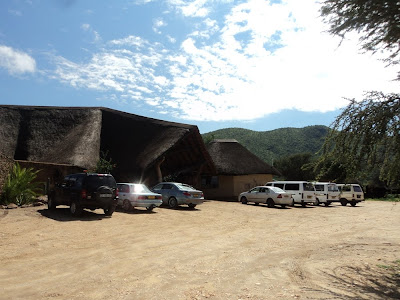by hand and by brain to earn your pay
who for centuries long past for no more than your bread
have bled for your countries and counted your dead..."
-Dropkick Murphys, "Worker's Song"
Last Thursday, my organisation made submissions at a public hearing to the National Council's Standing Committee regarding motions on the plight of domestic workers.

the beautiful Parliamentary Gardens
One of the recurring themes of my work in Namibia has been that the country has decent comprehensive legislation, but inadequate implementation/enforcement. The situation for domestic workers is no difference. The Labour Act is quite comprehensive and includes a lot of important rights and legal protection for all employees, including domestic workers. The problem, unfortunately, is enforcing those rights and obligations. Domestic workers remain one of the most vulnerable, underpaid groups of workers in Namibia.
This has to do with the specific environment of the domestic worker. For one thing, these domestic workers work in private households, whether as nannies or housekeepers or whatever, where they are isolated from other workers and may not be as aware of their labour rights under the law. Also, because employers tend to be private individuals like you or me just needing help around the house, rather than big professional corporations who might have lawyers and HR consultants, etc., the employers of domestic workers aren’t necessarily informed about what their obligations are under the law either. The number of inquiries I’ve handled at my office from employers wanting to know what they are allowed to do with their workers is a testament to that fact.
And we can’t ignore the gendered nature of domestic work. Obviously, many domestic workers are female. Housework and child-minding, as “women’s work”, tends to be undervalued all over the world, not just in Namibia. Before Namibia’s Independence, domestic workers weren’t even recognized as employees under labour legislation and therefore had no legal protection. Luckily, after Independence, the Labour Act was changed to include domestic workers in the definition of employee. Nevertheless, it has been a constant struggle to convince people that domestic workers are real legitimate employees deserving labour rights as much as any other worker.
These problems were not helped by the fact that the domestic workers' union fell apart and became defunct, and was later absorbed into the union for farmworkers, who are also subject to frequent labour violations, but face different types of problems than domestic workers, who must deal with issues like sexual harrassment on the job.
My organisation, which has been shortlisted this year for the prestigious Women Deliver 50 list of the 50 top inspiring ideas and solutions that deliver for girls and women, has been advocating for the labour rights of domestic workeres for a while now. We've put out some publications on labour rights, including fact sheets and, of course, a comic book...two, actually.
At the public hearing, we proposed the following recommendations regarding domestic workers to the National Council:
1. Raise awareness about the rights of domestic workers. Especially to employers, who often do want to treat their workers properly, but just don't know what the law is. Personally, I hope this awareness-raising comes out in form of more comic books.
2.Do a better job of enforcing the labour rights of domestic workers. As I mentioned, the laws are there, but the implementation is not.
3.Minimum wage for domestic workers. As my organisation pointed out at the hearing, it's kind of hard to believe that farm workers have a set minimum wage but domestic workers don't.
The public hearing was a pretty neat experience and I'm glad I got to be a part of it, even though I was suffering from a huge migraine that day. The National Council, which is kind of like Namibia's Senate, is housed in a beautiful modern-looking building on the Parliament grounds. I was also impressed by the state-of-the-art technology of the room where the public hearings were held, with comfortable chairs, carpet and wood panelling, modern interior designs, and microphones...although strangely enough, the only person who didn't get a microphone was the witness testifying at the stand. You'd think they would be the one who'd needed the microphone the most.
It was also interesting to learn about Namibia's specific labour issues regarding domestic workers, especially since it seems like each country deals with its own unique problems. Canada, for example, has hundreds of live-in caregivers that come from foreign countries like the Philippines to live with and work for Canadian families in their homes. These workers are also vulnerable to exploitation and labour violations. For my International Labour Law class in law school, I wrote a paper comparing the various labour legislation governing live-in caregivers in Canada, Hong Kong, and the Philippines. In that paper, I also argued that the biggest problems with the legal mechanisms in all three countries was the gap between the law, setting out workers' rights on paper, and the reality, the enforceability of these rights - partly due to the very nature of live-in domestic work. Kind of like what we are seeing here.
Anyway, our submissions at the hearing went well, and R. even ended up being broadcast on national TV by the Namibian Broadcasting Corporation. Hopefully we will start to see some change.
"We're the first ones to starve, we're the first ones to die
The first ones in line for that pie-in-the-sky
And we're always the last when the cream is shared out
For the worker is working when the fat cat's about..."
-Dropkick Murphys





















































